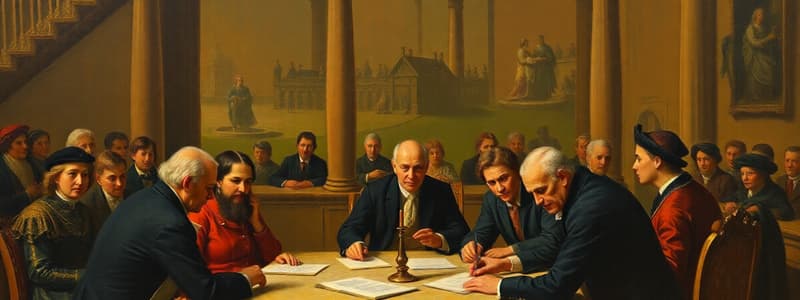Podcast
Questions and Answers
What does legitimacy refer to in a political context?
What does legitimacy refer to in a political context?
- The power a government holds over its citizens.
- The effectiveness of political communication.
- The belief that a political order is just and valid. (correct)
- The economic stability of a nation.
What is one key concern for political and social theorists regarding societal order?
What is one key concern for political and social theorists regarding societal order?
- The rise of authoritarian regimes.
- How conflicting interests are managed to prevent chaos. (correct)
- The uniformity of beliefs within society.
- The economic disparity among citizens.
Which statement correctly distinguishes democracy from legitimacy?
Which statement correctly distinguishes democracy from legitimacy?
- Legitimacy is only applicable to authoritarian regimes.
- Democracy is one way to legitimize rule, but not the only way. (correct)
- Legitimacy is achieved solely through democratic processes.
- Democracy and legitimacy are the same concepts.
Who is associated with the concept that a strong ruler must also convert strength into right?
Who is associated with the concept that a strong ruler must also convert strength into right?
What did Max Weber describe as the monopoly of legitimate use of physical force?
What did Max Weber describe as the monopoly of legitimate use of physical force?
What is one reason societies do not collapse into a 'war of all against all' according to social theorists?
What is one reason societies do not collapse into a 'war of all against all' according to social theorists?
What was a significant outcome of the Good Friday Agreement?
What was a significant outcome of the Good Friday Agreement?
Which of the following can provide legitimacy to a regime apart from democracy?
Which of the following can provide legitimacy to a regime apart from democracy?
Flashcards
Political Legitimacy
Political Legitimacy
The idea that a particular political system is fair and acceptable to its people, giving it moral authority.
Monopoly of Coercion
Monopoly of Coercion
The use of force or threat of force by the state to maintain order and enforce laws.
The Problem of Order
The Problem of Order
The process of reconciling diverse opinions, interests, and preferences within a society to maintain stability.
Nationalism
Nationalism
A belief that a group of people sharing a common history, language, or culture form a nation and deserve self-rule.
Signup and view all the flashcards
Democracy
Democracy
A system of government where citizens have the power to elect their leaders and participate in decision-making.
Signup and view all the flashcards
Tyranny of the Majority
Tyranny of the Majority
The potential for a majority to exploit or oppress minority groups within a democracy.
Signup and view all the flashcards
Legitimisation
Legitimisation
The ability for a regime to convince its people that its rule is just and valid.
Signup and view all the flashcards
Democracy in Divided Societies
Democracy in Divided Societies
A key political concept that deals with the balance of power, stability, and social order in diverse societies.
Signup and view all the flashcardsStudy Notes
Week 5: Democracy in Divided Societies
- The topic is democracy in divided societies, specifically focusing on Northern Ireland.
- The Good Friday Agreement and the Northern Ireland Executive are key elements of the discussion.
- The week will cover legitimacy, order, and the tyranny of the majority, along with the origins of Northern Ireland related to sovereignty, legitimacy, and partition.
- The Good Friday Agreement of 1998 and the Northern Ireland Executive will be discussed.
- A further strand of analysis will be "Strand Two: The North-South Dimension."
1. Legitimacy, Order & the Tyranny of the Majority
- The problem of reconciling different opinions, preferences, and interests to maintain social order will be examined.
- The question of why societies do not collapse into a "war of all against all" (Hobbes 1651) is a key concept.
- The idea of legitimacy involves the belief that a political order is just and valid, and that a ruler or regime is acceptable to its members.
- The concept of a "monopoly of coercion" (Max Weber) regarding a state's successful claim on the legitimate use of physical force within its territory is relevant.
2. The Origins of Northern Ireland: Sovereignty, Legitimacy, and Partition
- This section will delve into how Northern Ireland was created, looking at issues of sovereignty and legitimacy.
- The presentation will show historical data about seats won in the 1918 Election, by Unionists.
- Data related to the Catholic population distribution in Northern Ireland will be part of this section, showcasing specific census data from 2001.
- Maps and population data for Ireland in 2020 will also be included for context.
- The history and conflicts surrounding Northern Ireland, including images of periods of conflict, are part of this section.
3. The Good Friday Agreement of 1998
- The Good Friday Agreement is presented as a kind of constitution for Northern Ireland, laying out the governmental structures.
- The agreement includes detail about East-West and North-South relationships.
- It was publicly approved by the people of Northern Ireland and the Republic of Ireland.
4. The Northern Ireland Executive
- The Executive's structure involves a First Minister and a Deputy First Minister.
- These positions are chosen from the largest parties representing each major viewpoint (unionist or nationalist)
- The executive operates using the D'Hondt formula to select officials.
- The executive includes a ten-member executive office, similar to the Department of the Taoiseach in the Republic of Ireland, and is comprised of eight different departments and their responsibilities.
- Details on how the executive operates and its history of instability, including periods where the executive collapsed, are discussed.
5. Strand Two: The North-South Dimension
- Strand Two focuses on the interactions between Northern Ireland and the Republic of Ireland through a North-South Ministerial Council.
- The council's objectives and six areas of co-operation will be outlined.
- The functions of the North-South Implementation Bodies will also be presented, along with their staff and budgetary information for 2016.
Studying That Suits You
Use AI to generate personalized quizzes and flashcards to suit your learning preferences.




